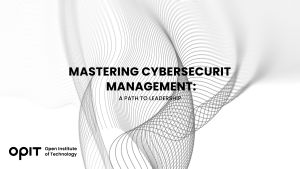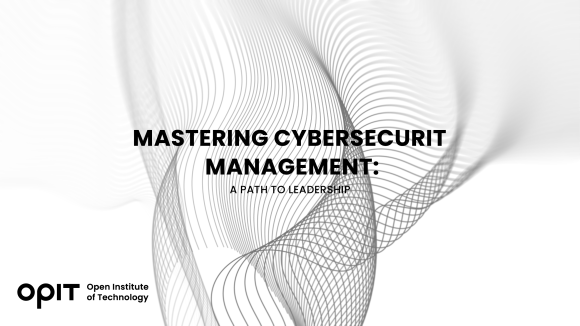Have you ever thought about how businesses keep their digital assets under a tight lock?
Companies have a secret weapon against cyberattacks – a specialist with a Master of Science in Cybersecurity Management and Policy. Keeping digital assets may seem effortless, but it’s no small feat, especially with hackers getting more prolific by the minute. The specialists are the ones who lead the charge in the fight for cybersecurity.
This degree is your golden ticket to moving up the ranks and becoming the master of cyber defense strategy who knows how to keep information safe against all odds. It bridges technical skills and strategic and management acumen.
Understanding the Master of Science in Cybersecurity Management
What is the purpose behind the Cybersecurity Management and Policy master’s degree? Since it is about cybersecurity management, you’ll learn how to take charge of a team or department. You will also gain the necessary technical and practical know-how to either organize a defense strategy against cyber attacks, or carry it out yourself.
The usual topics that this curriculum covers include:
- Cybersecurity policies. You will learn what they are and how to apply them in real-life scenarios, adapting them to fit different organizations.
- Risk management. With this course, you’ll learn about identifying the ‘what-ifs’ and planning how to dodge potential attacks. For example, you might be applying General Data Protection Regulation (GDPR) standards within a multinational corporation.
- Compliance standards. In these courses, you learn about keeping everything up to code with the latest regulations, especially given that the rules change rapidly, notably, in healthcare and finances.
- Strategic leadership skills. The skills you learn here sets you up to lead projects and teams. A good leader directs everyone to follow the same path in implementing cybersecurity initiatives, and this program molds you into an unparalleled leader and the brain of an operation.
Other topics you may see in this master’s curriculum are:
- Cyber threat identification
- Defense strategies
- Regulatory frameworks
- Cybersecurity law
- Incident response
- Ethical hacking
- Digital forensics
- Network security
- Information assurance
- Crisis management
- Project management in IT security
- Communication skills for leadership
The goal of the curriculum is to shape professionals who are savvy enough to manage cyber risks and inspired enough to lead from the front, driving cybersecurity initiatives with confidence and know-how. They become the kind of leader who doesn’t just respond to threats but anticipates them, with a team ready to back up. For example, it could manifest as charting out defense strategies and encouraging collaboration on security between different departments in the company.
Check out OPIT degrees
-
Career aligned
-
Fully Online
-
EU-accredited institution
Exploring the Program’s Benefits
The Cybersecurity Management and Policy master’s degree is the perfect multitool of knowledge that prepares its prospective graduates for diverse roles. Beyond learning the basics of fending off threats, it boosts your skills in designing and implementing solid cybersecurity strategies. It also sharpens your mind for critical thinking and decision-making, which is fit for a leader. It’s a way to understand the why behind the strategies you learn, predict future threats, and make decisions that could steer the course of your company’s cybersecurity.
Businesses today are looking for someone who can keep their data safe and also leaders who can handle the complicated layers of digital threats with a steady hand. Graduates who pass the Master of Cybersecurity Management course are ready for these high-demand and high-value roles that blend technical savvy and management acumen. This degree shows that you have a rare blend of technical know-how and management prowess, which makes you a sought-after team member for businesses across all industries.
Career Pathways With a Cybersecurity Management Degree
And where can this degree take you? Many careers await those who complete this degree, such as:
- Cybersecurity manager
- Chief Information Security Officer (CISO)
- Security consultant
- IT project manager
Let’s take a more detailed look into each of these prospective career paths awaiting a Master of Science in Cybersecurity Management. First off, being a cybersecurity manager is a lucrative career. In this role, you steer a team through digital threats to keep company data safe.
The Chief Information Security Officer (CISO) puts you in charge of keeping the bad actors out. You shape the cybersecurity strategy of your organization. It’s a role where you have a direct line to the top, advising them on how to keep digital assets under a tight lock.
Security consultant lets you get insights into different companies, diagnose their security health, and prescribe the best solutions to keep them safe. It’s a role that mixes problem-solving with a bit of cybersecurity advocacy as you spread the word on keeping data secure.
And let’s not forget the IT project manager. In this role, you’re the one that helps cybersecurity projects run on time, within budget, and achieve the goals they’re supposed to. It’s a strategic juggling of resources, timelines, and people.
There is a growing demand for people who can blend tech smarts with leadership skills. It doesn’t matter if you’re eyeing a spot in a tech company, a bustling financial institution, or a government agency – they’re all on the lookout for talent that can manage the cybersecurity challenges of today and tomorrow.
OPIT’s Master’s Program in Enterprise Cybersecurity
OPIT’s Master of Science in Enterprise Cybersecurity is the leading degree for anyone who sees personal value in tackling its challenges and reaping its lucrative benefits, such as the prestige and high pay. It’s a program that gives you the best of both worlds: the technical know-how and the leader’s and thinker’s edge. OPIT’s modern and advanced master’s program features real-world scenarios, hands-on projects, and rubbing virtual shoulders with experts who live and breathe cybersecurity.
The team behind OPIT has the latest tools, a dream team of seasoned professionals, and connections to the cyber community that you just won’t find anywhere else. They also there for you with support services, career advice, and professional development programs that put the cherry on top of your learning.
Check out OPIT degrees
-
Career aligned
-
Fully Online
-
EU-accredited institution
Learn Cybersecurity With Us
Stepping into a Master of Science in Cybersecurity Management is more than a smart career move. It’s a move toward becoming a leader in a field critical to almost every aspect of everyone’s digital lives. With OPIT, you gain a fully accredited degree that sets you up to be a cybersecurity expert and a leader. If you’re ready to take on the challenge of leading a team and protecting a company’s most vital assets, contact OPIT for more details.






